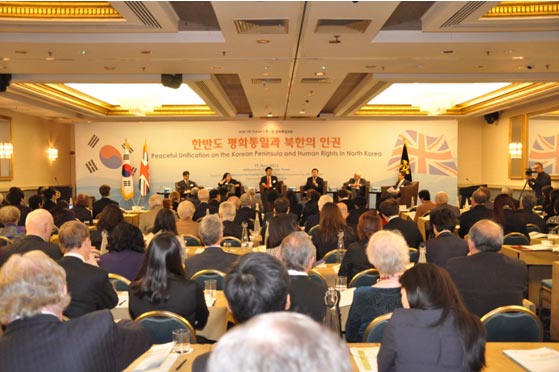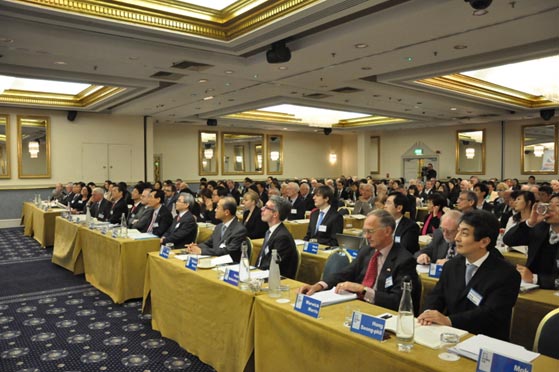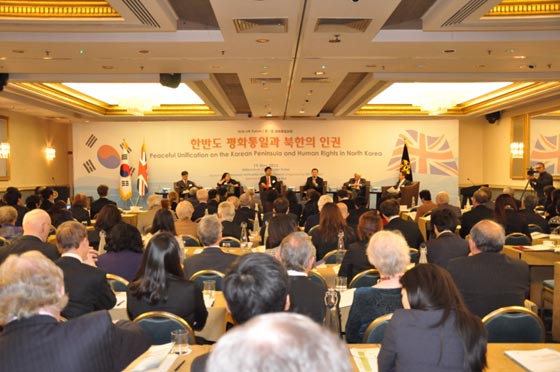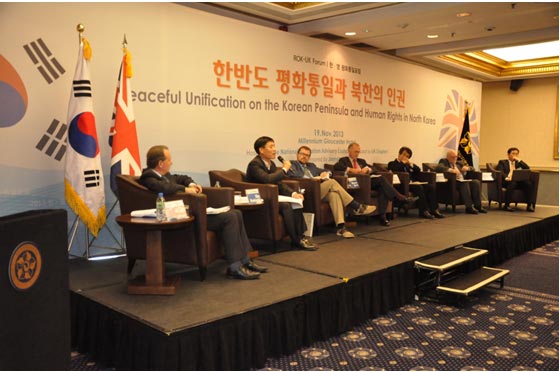Korea-U.K. Peaceful Unification Forum Held in London on Nov. 19.
State Visit of the President to the U.K. on the occasion of the 130th Anniversary of Korea-U.K. Diplomatic Ties
Understanding the National Unification Policy and Seeking Methods of Cooperation
The “2013 Korea-U.K. Peaceful Unification Forum” was held last Nov. 19 at the Millennium Gloucester Hotel in London, U.K. to enhance the understanding our unification and Inter-Korean policy in U.K. societies and seek a method of cooperation on the occasion of the 130th Anniversary of Korea-U.K. Diplomatic Ties and President Park’s state visit to the U.K.
15 specialists from Korea and the U.K. were invited to the forum to discuss △ Implementing “The Korean Peninsula Trust-Building Process and Method of Korea-U.K. Cooperation, △ Real State of Human Rights in North Korea and Method to Improve It under the subject of “Peaceful Unification of the Korean Peninsula and Human Rights in North Korea”.
120 persons from U.K. political circles and the government, Korean War veterans, university students, 200 members from the Korean side of NUAC and leaders of the Korean Community in the U.K. attended the forum.
☆Opening Ceremony and Keynote Address
The Forum lasted from 2 p.m. to 7 p.m. and it proceeded with △ Opening Speech by Shin Wu-seung, Head of the U.K. Municipal Chapter △ Welcoming Speech by Lim Seong-nam, the Korean Ambassador to U.K. △ Congratulatory Address by Richard Morris, Director of the Pacific Region of the U.K. Foreign Ministry, and Peter Bottomley, Secretary General of the All Party Britain-Republic of Korea Parliamentary Group △ Keynote address by Park Chan-bong, Secretary General of NUAC and presentation by Mark Fitzpatric, Manager of the Non-Proliferation of Nuclear Weapons and Arms Reduction Research Team of International Institute for Strategic Studies in the U.K.
Park Chan-bong, Secretary General of the NUAC explained the “Korean Peninsula Trust-Building Process” of the Park Geun-hye administration, its vision and method to implement the policy in his keynote speech.
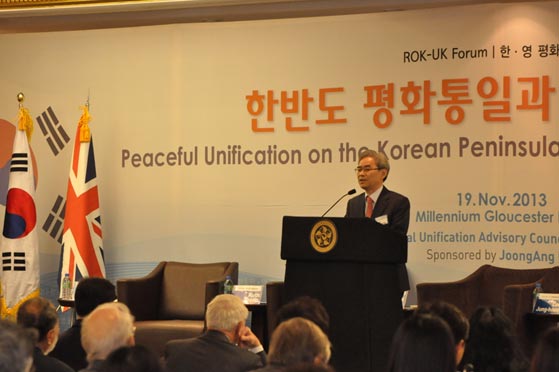
Park Chan-bong, Secretary General of NUAC giving the keynote speech
Park said, “The Korean Peninsula Trust-Building Process aims at having a unified Korea where the Korean people can enjoy freedom and happiness and the ultimate happiness of Korean people can be achieved by a peaceful unification only. The economic level of a unified Korea we want in terms of national income is US$40,000 per capita and it will be possible by two epoch-making changes in the Korean Peninsula such as △ Conversion of North Korean system △ National Unification.
The North Korean economy could grow 15% every year by converting its system and its economy can be developed drastically by economic supplementation between the South and North through national unification (effect of conversion of North Korean system), expanded domestic markets of North Korea and improved accessibility tooverseas markets (effect of unification).
He emphasized that the Korean Peninsula Trust-Building Process is to solve North Korean issues including the nuclear problem and achieve peaceful unification and it is not a rigid policy towards the North but a soft policy for North Korea.
He asked U.K. societies to convince North Korea to be cooperative with South Korea in promoting national unification based on mutual trust and solving the North Korea nuclear issue.
Shin Wu-seung, head of the U.K. Municipal Chapter and organizer of the forum, said in his opening speech, “Various circles of U.K. societies are paying more attention to the issue of the Korean Peninsula on the occasion of President Park’s state visit to the U.K. and this forum can be a good opportunity to enhance understanding on the Korean Peninsula issue and the Korean Peninsula Trust-Building Process should proceed in creative and practical manner.”
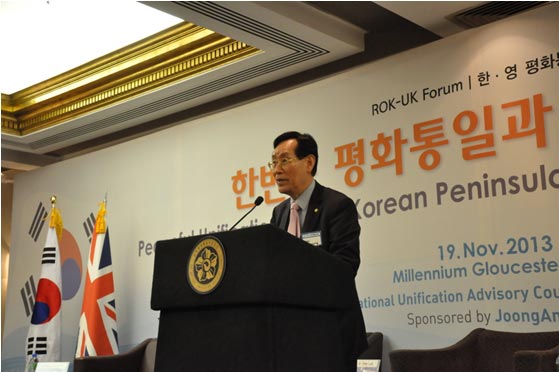
Shin Wu-seung, Head of U.K. Municipal Chapter
Korean Ambassador to the U.K. Lim Seong-nam explained the activities that took place during President Park’s state visit to the U.K. and London’s support for the Korean Peninsula Trust-Building Process. He emphasized the importance of support from international societies including U.K. and overseas Koreans on the policy.
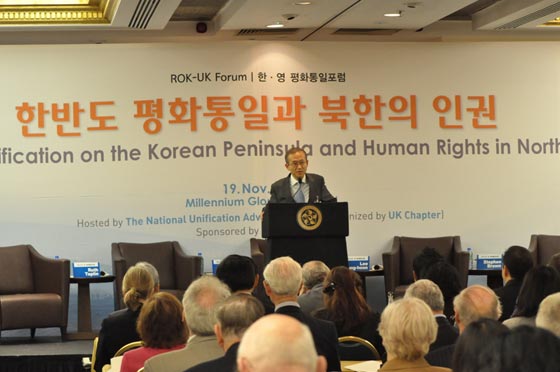
Korean Ambassador to the U.K., Lim Seong-nam
Richard Morris, Director of the Pacific region of the U.K. Foreign Ministry said in his congratulatory speech, “2013 is a special year as President Park’s state visit to the U.K. was made on the occasion of the 130th Anniversary of Korea-U.K. diplomatic ties. The partnership between the U.K. and Korea will be broadened and strengthened.”
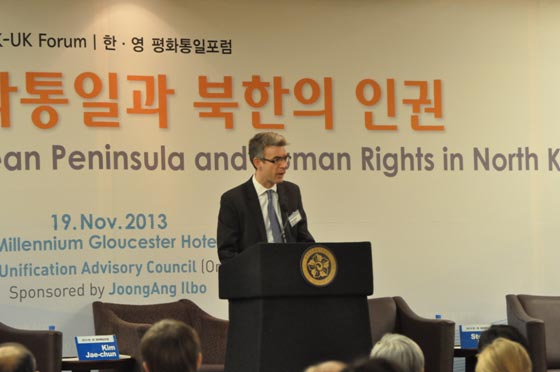
Richard Morris, Director of the Pacific Region of the U.K. Foreign Ministry
Peter Bottomley, Secretary General of the All Party Britain-Republic of Korea Parliamentary Group said, “South Korea has been inducing North Korea to change with patience as a leader of freedom and democracy based on common sense. U.K. supports such efforts of South Korea.”
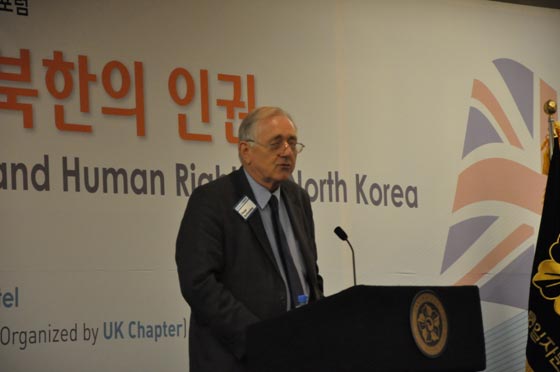
Peter Bottomley, Secretary General of All Party Britain-Republic of Korea Parliamentary Group
Mark Fitzpatric, Manager of the Non-Proliferation of Nuclear Weapons and Arms Reduction Research Team at the International Institute for Strategic Studies (IISS) in the U.K. presented on the subject of “Unification – The Best Policy to Solve the Threat from North Korea and Human Rights” and said, “The only method to solve the tragedy of Korean Peninsula including North Korean threat and the human rights in the country is democratic and peaceful unification of the Korean Peninsula.”
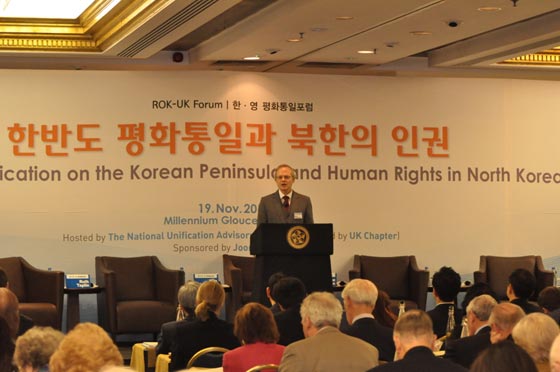
Mark Fitzpatric, Manager of the Non-Proliferation of Nuclear Weapons and Arms Reduction Research Team of International Institute for Strategic Studies of the U.K
Mark Fitzpatric added, “North Korea’s obsession over nuclear weapons and worsened human right situation in the country without external pressure indicates that North Korea suffers from serious internal problems. Accordingly international societies should prepare for mobilizing all the available means of policy to solve them.”
He asserted that the best policy of neighboring countries is to provide North Korean people with correct and detailed information and he suggested that the countries try diversified methods to inflow information to North Korea.
He urged that the Korean Peninsula Trust-Building Process be used to cope with the threat from North Korea decisively and expand dialogue and cooperation to induce change. It is a careful policy that can get support from international societies.
☆First Session: Implementing Korean Peninsula Trust-Building Process and Method of Korea-U.K. Cooperation
The First Session of the forum was held under the subject of “Implementing the Korean Peninsula Trust-Building Process and Method of Korea-U.K. Cooperation,” and presided under Prof. Kim Jae-cheon of Seogang University and Prof. Lee Jeong-hun of Yongsei University (International Human Rights Ambassador), Prof. Park In-hwi of Ewha Womans University, Steven Brown, former U.K. Ambassador to Korea and Ruth Taplin, Director of the Japan-East Asia Institute of the U.K. attended the discussion.
Prof. Lee Jeong-hun said, The “Korean Peninsula Trust-Building Process of the Park Geun-hye administration is a new vision and approach to inter-Korean relations.”
He explained that dialogue and support in the past between the South and North could not be developed to real terms of reconciliation. The country went backward to being abnormal due to the North Korean nuclear issue and long range missile and human rights in North Korea. Core of Korean Peninsula Trust-Building Process is to develop abnormal inter-Korean relationship to be normal to solve key problems between the two Koreas”
He continued, “The policy that the Korean Peninsula Trust-Building Process pursues is to establish a final status of the Korean Peninsula to be of grand unification and all the policies are concentrated on the grand unification. Instead of short term effects of improved relations between the South and North, a trust building process is to come closely to the ultimate goal of the unification of Korean Peninsula by attacking the core of the problem.”
In other words, he explained that trust building process is the only alternative for national unification and normalizing inter-Korean relation.
Prof. Lee said that because South Korea only expected North Korea to show goodwill for the cooperation initiated by South Korea, inter-Korean relation could not be developed. The policy of the current administration of Korea is to adhere to a principle, like the case of all the commotion of withdrawing North Korean workers, from Gaeseong Industrial Complex in North Korea.
Prof. Park In-hwi said that the Korean Peninsula Trust-Building Process is a policy for alignment with international societies to promote customized policy in consideration of the extent of a global standard trust in the Korean Peninsula and North East Asia as well as characteristics of both South and North Korea. She emphasized the necessity of friendly cooperation of international society to achieve peaceful unification of South and North Korea.
Steven Brown, former U.K. Ambassador to Korea said, “From my point of view on the Korean Peninsula issue as U.K. Ambassador to Korea from 1997 till 2000, the Korean Peninsula Trust-Building Process can make contributions to normalizing inter-Korean relationship, which will result in easing military and political tension on the peninsula and after all improving international security and regional stability”
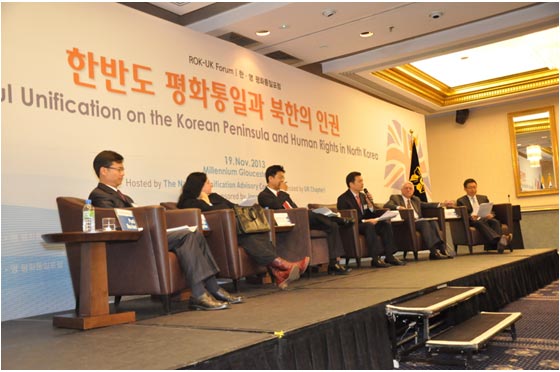
Prof. Park In-hwi, Director Ruth Tapline, Prof. Kim Jae-cheon, Prof. Lee Jeong-hun, Ambassador Steve Brown and Prof. Jo Yoon-yeong, from left to right
Prof. Jo Yoon-yeong said, “The core of the Korean Peninsula Trust-Building Process is to resist against the nuclear of North Korea and promoting dialogue and exchange and cooperation between two Koreas. It is to lead inter-Korean relation softly and flexibly beyond the binary inter-Korean policy of a hard and soft line policy, approaching the ultimate goal of national unification most closely.”
She added that support of the international society is essential for the success of a Trust Building Process. She asked U.K. △ to support South Korea to play leading roles in improving inter-Korean relationship △ to exercise joint efforts to solve the nuclear issue of North Korea △ to strengthen public diplomacy between South Korea and the U.K. △ to exercise U.K.’s influences over the U.S.A. and EU, which have been traditional allies of South Korea.
Director Ruth Tapline said, “Successful economic cooperation at Gaeseong Industrial Complex can attract the investment of international societies in North Korea. Therefore, it is important to formulate mutual trust between the South and North step by step.”
☆Second Session: Reality of Human Rights in North Korea and Method to Improve It
The Second session under the subject, “Reality of Human Rights in North Korea and Method to Improve It” was presided over by Warwick Morris, President of the U.K.-Korea Association, where Prof. Hong Seong-pil of Yonsei University Prof. Adam Cathcart of Leeds University, Kim Kwang-jin, senior researcher of the Institute for National Security Strategy, Prof. James E. Hoare of London University, Jo Jeong-hyun, senior researcher of Korea Institute for National Unification and U.K. Senator David Alton joined the forum.
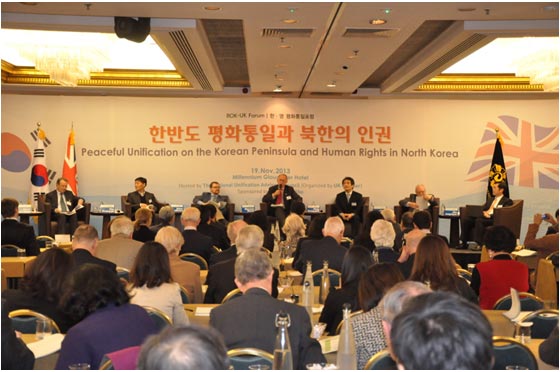
Senator David Alton, Dr. Kim Kwang-jin, Prof. Adam Cathcart, President Warwick Morris, Prof. Hong Seong-pil, Prof. James E. Hoare and Dr. Jo Jeong-hyun, from left to right
Prof. Hong Seong-pil said, “Human rights in North Korea have been deteriorating continuously due to △ unique characteristics of North Korean systems △ learning wrong lessons from the collapse of Sadam Hussein, Muammar Gaddafi and other dictators △ isolation and instability of North Korean systems. Efforts of international societies should continue to improve human rights in North Korea.”
In particular, he asserted that news media, NGOs or international organizations should evaluate the human rights in North Korea regularly and continue their recommendation to exercise their influences over North Korea with powerful voice”
Prof. Adam Cathcart said, “Kim Jung-eun regime blocks off refugees and punishes them as its top priority, subject and makes use of some refugees re-entered North Korea from South as propaganda. North Korea revised its strategy to deal with the re-entered refugees skillfully to strengthen its regime”.
Kim Kwang-jin, a senior researcher, pointed out that since Kim Jung-eun succeeded in his father’s position, defection from North Korea is more closely controlled, re-entrance into North Korea by defectors is encouraged and they are made use of for domestic propaganda and psychological warfare against South Korea. He suggested solving the human rights issue of North Korea by △ recording the miserable reality of infringing personal rights △ formulating public sentiments internationally △ applying the concept of human security to North Korea, Making full use of UN Commission of Inquiry on Human Rights in the DPRK.
James E. Hoare, a senior researcher said. “Raising problems cannot only solve human rights issue in North Korea. So, a realistic solution is to induce change in North Korea by dialogue, contact and exchange.”
Jo Jeong-hyun, the researcher said, “the Kim Jung-eun regime strengthens internal control due to the unstable situation of North Korea and tightens border control and refugees”. He the explained seriousness of human rights in North Korea in detail including the status of North Korean refugees, political prisoner camps and North Korean workers overseas.
He suggested following to improve human rights in North Korea: △ to approach the right of freedom and social right in harmony △ Along with a hardline approach, promote pacificatory measures such as humanitarian support for the vulnerable class of people △ to promote human rights dialogue and technical cooperation continuously △ International organizations, individual countries and NGOs shall endeavor and cooperate in a way suitable for their roles continuously.
Senator David Alton said, “North Korea’s refusal of cooperating with the UN Commission of Inquiry on Human Rights in the DPRK means Pyeongyang does not want to improve human rights issues and the international isolation of North Korea, will worsened be worse. But North Korea may change some day suddenly like the case of Burma, which I watched recently.”.
The Senator continued that it is necessary to understand the people of North Korea for unification and we need to understand mental state of people who were oppressed by Japanese Imperialism, paranoia of Stalinism, purges and brain washing.
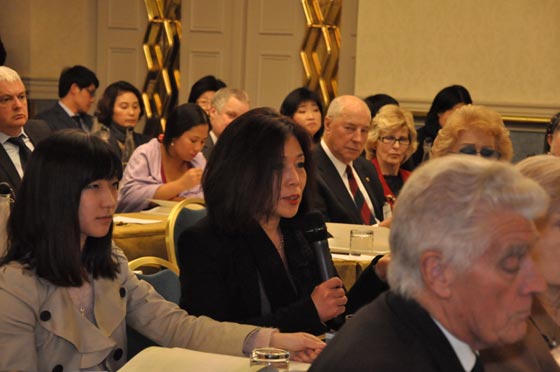
A member of the audience asking a question
The Audience attending the forum was actively involved in a debate. They asked many questions about the problems that may occur after unification, method to solve the gap between two Koreas, human right situation in North Korea, actions to improve human rights in North Korea and also they suggested their own opinion on the above questions.
The forum lasted about five hours and the participants evaluated the event to enhance their understanding Korean Peninsula issue and the hope and dream of a national unification of Korea could be shared by the U.K. and Korea together.
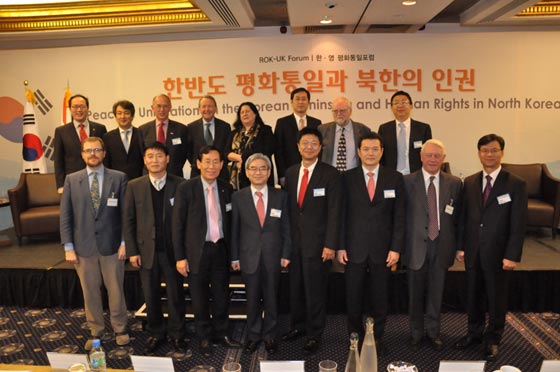
Korea and U.K. Panelists attending the Forum










